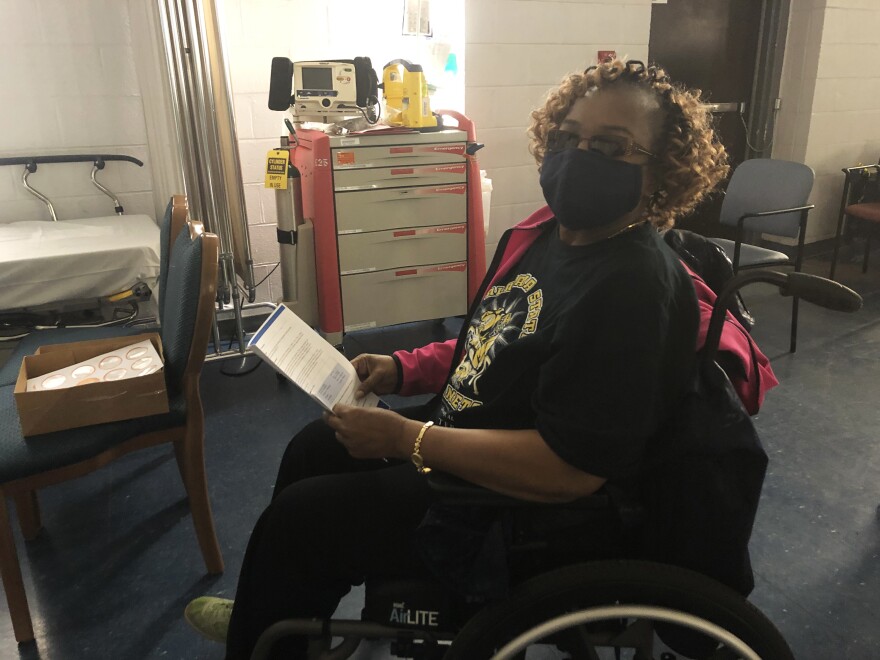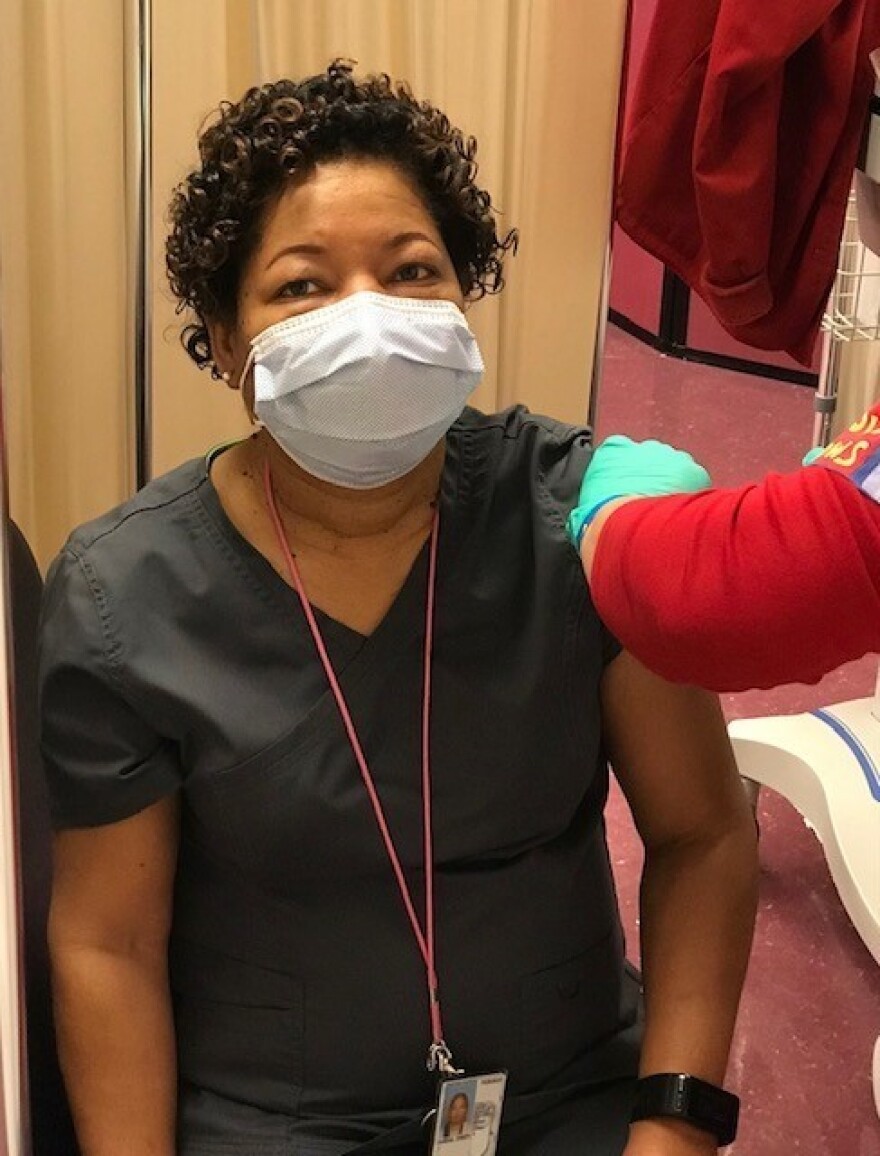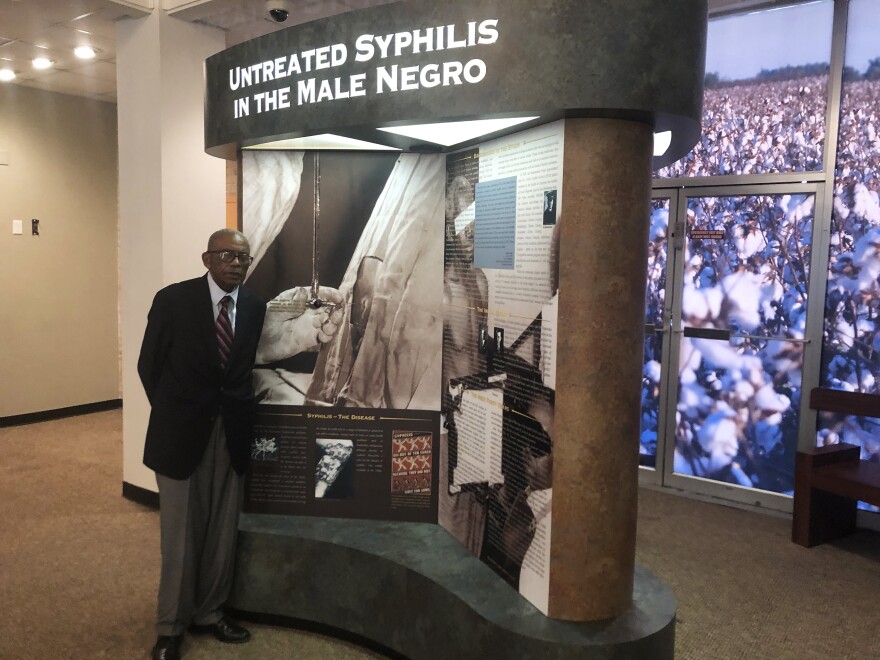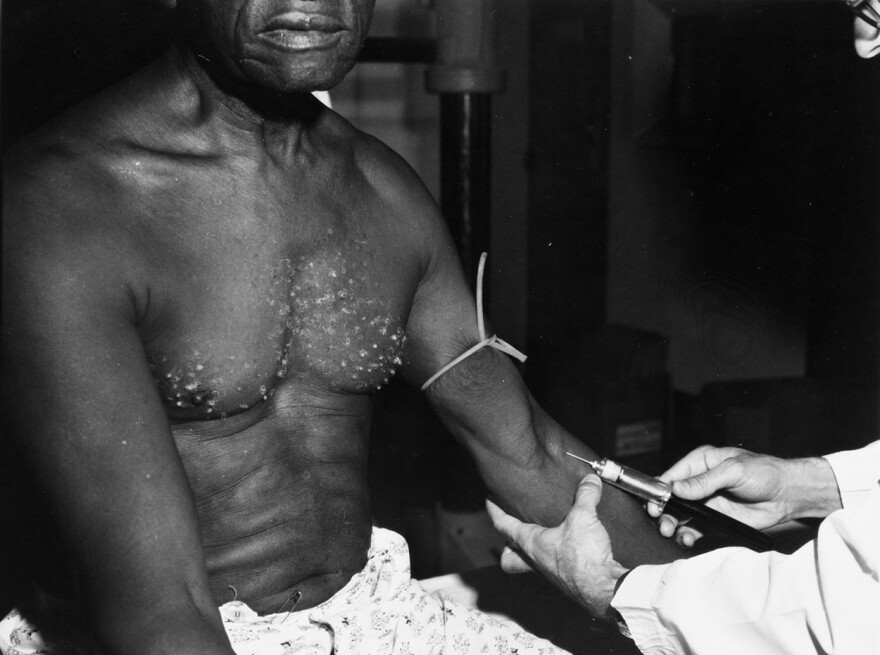A lingering mistrust of the medical system makes some Black Americans more hesitant to sign up for COVID-19 vaccines. It has played out in early data that show a stark disparity in whom is getting shots in this country — more than 60% going to white people, and less than 6% to African Americans. The mistrust is rooted in history, including the infamous U.S. study of syphilis that left Black men in Tuskegee, Ala., to suffer from the disease.
In Tuskegee today, that 20th century tragedy is still very relevant, according to nurse Cheryl Owens, who grew up in the town. She's been talking with friends and elderly relatives who say they're afraid to get the COVID-19 vaccine.
"So, I asked why?" she says. "And it was like, 'Well, you remember that Tuskegee syphilis study. That's why.' "
Officially named the Study of Untreated Syphilis in the Negro Male, the U.S. Public Health Service, working with the Tuskegee Institute, recruited hundreds of rural Black men in 1932. The study offered free meals and checkups, but never explained that participants would be human subjects in a study designed to withhold medical treatment.
"They had local leaders, church leaders, medical people to convince them to become involved with the study," says Owens, a nurse at the Central Alabama Veterans Health Care System.
Tuskegee, now a city of about 8,000 people, has a storied African American history as home to the Tuskegee Airmen. Booker T. Washington and George Washington Carver were educators here.
But the syphilis study also looms large in Tuskegee's collective memory. Owens, who is 59, says she remembers hearing about it in elementary school, so she understands why people in this nearly all-Black community are skeptical when the government says to take a shot.
"They felt that the government really wanted to inject something in their bodies and they were going to eventually die from that," Owens explains.
To help dispel that notion, Owens penned an op-ed, published in the local newspaper The Tuskegee News, including a photo of her getting a shot of the COVID-19 vaccine.

Ramping up vaccine rollout
Heath officials are up against a powerful sentiment as they try to ramp up vaccinations.
"I think a part of the challenge is that there's still a lot of anxiety about the vaccine," says Amir Farooqi, director of the Central Alabama VA. "It's unfortunate because it's a really great tool to help people protect their personal health as well as the public health."
The VA's Tuskegee campus has repurposed a large auditorium into a vaccine clinic, to allow for social distancing. Shots are given at one of four stations, partitioned off with privacy curtains.
Vietnam veteran Douglas Terry, 78, is relieved to be in the queue.
"With this there is hope," he says.
Terry doesn't even feel the stick when nurse Pamela Bell gives him his first jab.
"That's what we want to hear," she says, warning him that his arm might be a little sore for a while.
Terry says he intends to spread the word that he and his wife got the shot.
"To give them courage to do it also," he says.
That's what VA officials want to hear. They've set up a selfie station at the clinic and hand out stickers that proclaim, "I got vaccinated at the Central Alabama Veterans HCS to protect our Veterans and Community."

'Word of mouth will be key'
The VA's infectious disease physician, Dr. April Truett, says that kind of word of mouth will be key to overcoming reservations about the shot.
"The more people hear about the vaccine, the more they know someone else who's received the vaccine, the more they see how well they did, the more comfortable they become with the vaccine," she says.
In the broader community, elected officials in Tuskegee have also posted videos getting shots, and some residents say they've gotten letters from the presidents of historically Black universities encouraging inoculation.
"It's the biggest PR project to get Black people to take that vaccine," says Lucenia Williams Dunn, a former mayor of Tuskegee who now runs a local community development organization. She's 77 years old and has high blood pressure, but she's not convinced to get the vaccine.
Even though she's been watching the pandemic's devastating and disproportionate impact on African Americans, she still questions the rapid development of the vaccine. And then, there's the history.
"You cannot separate the experience of the past with what we believe in the present," Dunn says. "People say, 'well, you know, y'all ought not be worried about that syphilis study.' Yeah, we do, because it's part of our experience."

Descendants of men involved in Tuskegee study react
The vaccine rollout has sparked a conversation among descendants of the men involved in the syphilis study. Among them is Theilene Williams of Tuskegee. Her grandfather, Willie Fitzpatrick, died before knowing the truth about the study.
"We called him Papa," Williams says. "He was he was a good man, family man, a farmer."
Williams says there's a difference between what's happening now and what the government did to her grandfather and the other men.
"They didn't know what they were getting into," she says.
Williams, who is 72, says she was able to talk with her doctor about the vaccine.
"I went on and got it — the first shot," Williams says. "We know about it. We've been hearing, talking about it. It's not like 'come on, we're going to do this' without knowing anything about it like they did."
Her grandfather is among those now memorialized at the Tuskegee History Center on a large tile circle in the middle of the museum.
"Around here in alphabetical order, you have the names of all 623 men," says Tuskegee civil rights attorney Fred Gray, on a tour of an exhibit on the syphilis study.

Gray represented the men when the truth about the study came out in 1972. The men were not injected with syphilis, but those who already had it were left untreated, even once penicillin was available.
"Not only did they withhold treatment," Gray says. "But they sent these men's names to the various doctors in the area and told them if they came to their office, not to treat them for syphilis."
Gray won a $10 million settlement for the men and their families, and pressured Congress to prevent such unethical science.
"And the federal government passed laws which would prohibit now anyone, the government or anyone else from having a study like they did," he says.
Issue with people using syphilis study to refuse vaccine
Later, he got then-President Bill Clinton to apologize to the men and their descendants.
"What the United States government did was shameful," Clinton said in 1997. "And I am sorry."
Gray, now 90 years old, has had his first dose of COVID-19 vaccine. He takes issue with people citing the syphilis study as a reason not to get vaccinated. He says individuals must make their own decisions whether or not take the vaccine.
"But they shouldn't put it is because of what the government did to the men in the Tuskegee syphilis study, because they are altogether different situations," Gray says.

A January poll from the Kaiser Family Foundation found that more than half of Black adults surveyed said they did not have immediate plans to get vaccinated. Forty-three percent said they were going to wait and see how it's working.
The mistrust of the health care system among African Americans is two-fold, says Rueben Warren, director of the National Center for Bioethics in Research and Health Care at Tuskegee University — established and funded by the federal government as a result of the syphilis study.
"It's both historical and current," he says. "And not either/or but both/and."
Warren says the "use and abuse of Black bodies" dates to slavery, and continued for hundreds of years. He cites the eugenics movement, for example.
Now, he says, the coronavirus pandemic and its disparate impact on people of color have exposed the shortcomings of the U.S. health care delivery system. For instance, there's no hospital serving the general public in Tuskegee, and coronavirus testing was hard to come by early on.
So it's not just historical but it's current," he says. "The combination of that makes folks pause."
Warren says seeing the mayor or a community leader get a shot isn't the kind of assurance that people need. He says that's neglecting to consider that some people might not have health insurance that could help then manage any future complications.
"What about next year?" he asks. "Next year, if something comes up and I don't have health insurance, I'm out in the cold."
He advocates providing health coverage to the uninsured who get the vaccine.
That, Warren says, is a way of assuring people that the health care system will deliver for them in the future, despite the history.
Copyright 2022 NPR. To see more, visit https://www.npr.org.




